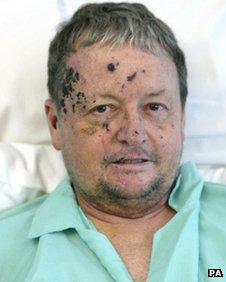Prof John Tulloch, 7/7 London bomb survivor, fights to stay in UK
- Published
A professor who was injured in the London 7/7 bombings says he fears he might lose his right to stay in the UK.
Prof John Tulloch, who lives in the Vale of Glamorgan, once held a British passport and has spent most of his life living and working in the UK.
But now semi-retired, he said he had been told he was no longer entitled to remain in the UK indefinitely.
The India-born academic believes he should be entitled to a UK passport but the UK Border Agency questions this.
Prof Tulloch said he was born to British parents in India before independence but, unknown to him, this conferred a lesser form of British nationality known as a "British subject without citizenship".
He said his British passport was confiscated in the 1990s after he had gained Australian citizenship.
The son of a British Army officer, he was raised and educated in Britain from a young age, and has lived or worked in the UK for most of his life.
He said several generations of his family had served the country with distinction.
But he now says he has been warned he can no longer permanently remain in Britain.
"My wife has a British passport, my sons both have British passports, my brother - who was born in India - has a full British passport but not me," he said.
Country's resilience
"My family goes back in Britain to [the year] 1200 or something. It's been traced, so what do you do?"

Prof John Tulloch suffered shrapnel injuries in the 7/7 bombings
Prof Tulloch was one of hundreds injured in the 7/7 blasts in 2005 when four suicide bombers attacked central London, killing 52 people.
He became a symbol of the country's resilience after his picture was published in the media after the 7/7 attacks. He was also visited by Prince Charles in hospital.
Shards of shrapnel were embedded in his face and he has suffered symptoms of post-traumatic stress disorder.
He told the inquest into the 7/7 deaths that he was partially shielded from the blast by the luggage at his feet.
Prof Tulloch says the uncertainty over remaining in the UK is worse for him than 7/7 because had been "lucky" on that day. He had survived then managed to go on a "journey" which saw him write two books related to his experiences.
But now he says he is struggling to stay in the country because of circumstances outside his control many years ago.
Prof Tulloch went to school in Bournemouth before attending Cambridge University then gaining further qualifications at Sussex University.
He then applied for academic jobs at universities in Britain and Australia and ended up at the University of New South Wales in Sydney, Australia.
'Gobsmacked'
"That's why fortunately I went to Australia, never thinking there was any issue of my losing my British residence," he said.
"The issue that caused this is because I took out Australian citizenship in 1983."
He said that unlike with a full British citizen, and unknown to him, the Australian citizenship cancelled his British nationality and his right to live in Britain.
When he tried to renew his passport around 20 years ago it was taken off him leaving him "gob smacked".
"I would've got full British citizenship before I went to Australia if I had known," he said.
Using his Australian passport with a work permit, Prof Tulloch has since held senior roles at Brunel University in London and the journalism school at Cardiff University, among others.
But he is now semi-retired and said he had been told by a senior immigration officer at Heathrow Airport that he would not be able to stay in the country indefinitely.
The UK Border Agency spokesperson said in a statement: "If you are a British subject otherwise than by connection with the Republic of Ireland or a British protected person you will lose that status on acquiring any other nationality or citizenship.
"It is the responsibility of an individual to check that they will not lose a previously acquired nationality or citizenship on acquiring an additional one."
Home Office sources said that Prof Tulloch was welcome to submit an application to extend his stay in the UK in an appropriate category and said it would be considered against the requirements of the UK's immigration rules.
- Published12 November 2010
- Published11 November 2010